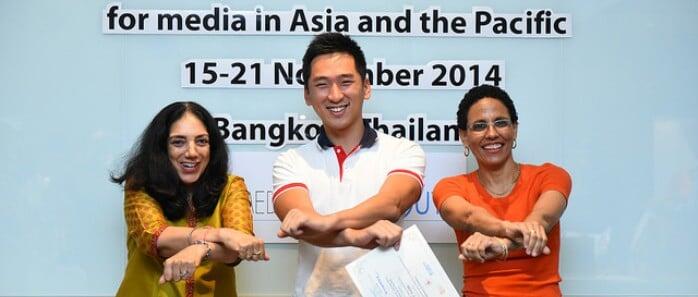BANGKOK, Thailand – “Think back to the first time you were told you couldn’t do something because of your gender. Now share that story with the person next to you.” There was a momentary silence as 27 journalists, both women and men, thought about how gender roles had limited their freedom of choice. But shortly afterwards, the room filled with noise as stories poured out.
The question was posed to journalists from 20 countries across the Asia and Pacific region who had been invited by UNFPA and UN Women to participate in a training on 'Reporting on Beijing+20, Youth Engagement and Gender Responsive Advocacy for Media in Asia and the Pacific'.
Despite their diverse cultural backgrounds, the journalists’ personal experiences with patriarchal gender limitations had much in common.
Her colleague Shreejana Shrestha, reporter for Nepal’s Republica Newspaper, echoed her sentiments: “I had never planned to report on gender because I always imagined it was too soft a topic for political journalism. However, after studying overseas, I saw that women experienced similar pain and suffering all over the world. I then understood that this was a big issue that must be reported.” “It is incredible isn’t it? No matter where you are these problems are so similar,” said Babita Basnet of the Media Advocacy Group in Nepal.
Too long a marginalized subject
All the journalists taking part in the workshop face a similar struggle and concern: Gender is still too often considered too 'soft' a topic for a serious news audience.
“I have been interested in gender politics since I reported on the Beijing Platform for Action 20 years ago,” said Rita Widiadana of the Jakarta Post in Indonesia. “I was there. It was confusing at first because I was taking on gender, which was considered a weird topic. Everyone else wanted to cover hard politics.”
Swapna Majumda of the Citizen News Service, India, agreed: “Politics was the area to be in if you were a serious reporter, because really, who would listen or print your stories if you were writing about women’s inequality?”
But during her time covering political campaigns, Ms. Majumda began to collect a more diverse range of political views.
But the passion for equality shown by the journalists attending the training indicates that talented writers are taking these issues very seriously and that they regularly share real stories about gender inequality with their readers, helping to shed light on the impact of gender politics and government legislation on their lives.Today, gender issues remain a marginal topic for journalists. In-depth, political, economic and socially-minded articles on gender equality are often relegated to the special interest columns of newspapers. “I would ask women for their opinion, and the answer was always the same: ‘You wouldn’t understand what we think, because you don’t know about our struggles.’ It was true. I didn’t know what they thought and how they lived, because I had never reported from their perspective… so I started expanding and I realized that everything in their lives was political in some way.”
“There is a reason feminists say ‘the personal is political’. The effect of gender inequality in our daily lives is politics in its most pure form,” said Kiran Bhatia, Gender Advisor at UNFPA’s Asia Pacific Regional Office in Bangkok.
Paving the way for further progress
Gender equality, women's empowerment and their reproductive health and rights, were at the heart of the bold new vision articulated 20 years ago in the Programme of Action of the International Conference on Population and Development (ICPD). The ICPD and the Beijing Platform for Action are integrally linked and remain as important as ever today, as the world comes together to map a post-2015 development framework.
But while much remains to be done, there has been significant progress since the landmark conferences two decades ago.
“Things have changed so much, including the awareness people, journalists, and governments have on these issues... I have done this for so many years, but the training with fellow journalists was refreshing because I was able to see how many people want to be part of the solution," said Ms. Widiadana.
"This is not just about governments and ministers anymore. This is about us, the media in this room, working together across our generations and cultures, towards a better future.”
– Christina Yiannakis


